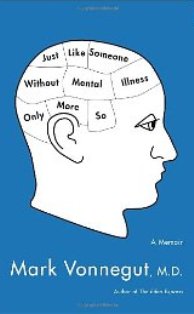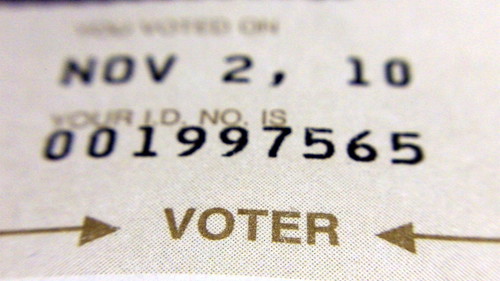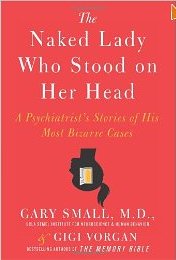November 16th, 2010 by Dinah Miller, M.D. in Better Health Network, Book Reviews
No Comments »


 I’ll cut to the chase: I loved this book. Five stars. Two thumbs up.
I’ll cut to the chase: I loved this book. Five stars. Two thumbs up.
When I read books, especially psychiatry books that I write about on Shrink Rap, I often read more carefully and sometimes more critically. I was so immersed in reading “Just Like Someone Without Mental Illness Only More So” that I didn’t stop to think, I just went on the journey.
Mark Vonnegut is a pediatrician and the son of my favorite author when I was in junior high school. His memoir is a poignant and candid account of his struggles with, well, life in general, and life with a psychotic illness in particular. Schizophrenia, bipolar disorder — who knows? (I’ll vote for bipolar disorder.) Some illness where he had three episodes in his twenties, then another episode 14 years later.
Thorazine and lithium and megavitamins and psych wards. Xanax and alcohol and how humiliating it is to be psychotic on a stretcher in the ER hallway of the hospital where he works. Divorce and remarriage. First and second families. Childhood as the son of a financially struggling, not-yet-famous eccentric writer, and adulthood as the son of an icon. Vonnegut is a hippy, a mainstream doctor, a middle-aged softball player, then finally a guy who accidentally poisons himself with wild mushrooms. Read more »
*This blog post was originally published at Shrink Rap*
November 14th, 2010 by DrCharles in Better Health Network, Health Policy, News, Opinion
3 Comments »

 When the Republicans took back the House of Representatives [recently], John Boehner, the presumptive new Speaker and current Senator from Ohio, unleashed a “sob heard round the world.” As The New York Times quotes:
When the Republicans took back the House of Representatives [recently], John Boehner, the presumptive new Speaker and current Senator from Ohio, unleashed a “sob heard round the world.” As The New York Times quotes:
“I’ve spent my whole life chasing the American dream,” (Boehner) said, beginning to cry. He swallowed and tried again. But describing all the bad jobs he had once led to near sobbing when he got to the line, “I poured my heart and soul into running a small business.”
Boehner has cried in public many other times, the recent election night being only the largest stage to date. The tears also flow at his annual golf tournament, or while watching a child pledge allegiance to the flag, listening to a Republican colleague speak about his Vietnam War experiences, the unveiling of a statue of Ronald Reagan, while accepting various awards, during a rendition of “America the Beautiful,” etc. Could these tears be signs of major depression? Should melancholy be a disqualification for leadership? Were Clinton’s tears any better? Read more »
*This blog post was originally published at The Examining Room of Dr. Charles*
November 3rd, 2010 by Steven Roy Daviss, M.D. in Better Health Network, Health Policy, Opinion
No Comments »


 Back in the 1970s, Kansas passed a law that could prevent people with mental illness from voting. The law was never used, but advocates were successful in getting an amendment passed that revoked that law.
Back in the 1970s, Kansas passed a law that could prevent people with mental illness from voting. The law was never used, but advocates were successful in getting an amendment passed that revoked that law.
This law was passed at a time when stigma against mental illness was much higher than now. I’m guessing it was presumed that folks with a mental illness could not reason enough to exercise an informed vote, which is not true, of course. If 1outta5 have a psychiatric illness, including anxiety, depression, and substance abuse, then there could have been a huge swath of disenfranchised voters.
And there already exists, to a degree, a basic cognitive test for voting: Navigating the whole ballot process. In Maryland, ours was electronic and no harder to use than an iPad, but I could still imaging some with severe dementia unable to navigate the system. But there should never be a cognitive bar one must pass to vote. The challenge would be where to draw the line.
*This blog post was originally published at Shrink Rap*
October 17th, 2010 by Dinah Miller, M.D. in Better Health Network, Book Reviews, Opinion, True Stories
No Comments »


 I just finished reading Dr. Gary Small’s book, The Naked Lady Who Stood On Her Head.
I just finished reading Dr. Gary Small’s book, The Naked Lady Who Stood On Her Head.
In the final chapter of the book, Dr. Small talks about his mentor, friend, and father figure who’s mentioned throughout the book. The mentor approaches him on the golf course, where they meet to talk, and says he needs psychotherapy and Small is the man to do it. The author is surprised, hesitant, and a bit uncomfortable with the demand (it comes as more than a request.) His wife likens it to the need for a plumber or a dentist, and Dr. Small takes on the task. The mentor calls all the shots: Where the meetings will be, what pastry they will eat, the form of his payment. The author initially misses the diagnosis and uses this as an example of how one can be blinded.
So is it okay for a friend to treat a friend? Read more »
*This blog post was originally published at Shrink Rap*
October 11th, 2010 by Dinah Miller, M.D. in Better Health Network, Health Policy, Opinion
No Comments »


 Look, he came back! Guest blogger Mitchell Newmark, M.D., put on his armor and came to blog with us again.
Look, he came back! Guest blogger Mitchell Newmark, M.D., put on his armor and came to blog with us again.
The Relative Unimportance of Diagnosis In Psychiatry
As we will soon be witness to the emergence of DSM-V, the new rule book for psychiatric diagnosis, I am reminded of all the pitfalls of diagnosis in psychiatry. In other fields of medicine, diagnosis is based primarily on etiology, with objective findings, rather than on symptoms alone, as it is in psychiatry. When you go to your internist with stomach pain, there’s an endoscopy to look for ulcers, a sonogram to look for gall stones, a blood test to look for hepatitis. But in psychiatry, there is no CT scan to check for bipolar disorder, no blood test to assess if the patient has schizophrenia, no spinal tap to check for major depression.
For the psychiatric community at large, diagnosis is important for many reasons. It helps doctors sort out patients so that clinical trials can be conducted on similar groups of patients. It enhances communication among psychiatrists when behavioral, affective and cognitive symptoms can be categorized. But for the individual patient, it is less useful. Some patients fit nicely into DSM categories, and others don’t. There are many patients who have unique combinations of symptoms across several diagnostic criteria. This leads to assigning multiple diagnoses, and confusing the treatment picture. Read more »
*This blog post was originally published at Shrink Rap*

 I’ll cut to the chase: I loved this book. Five stars. Two thumbs up.
I’ll cut to the chase: I loved this book. Five stars. Two thumbs up.














